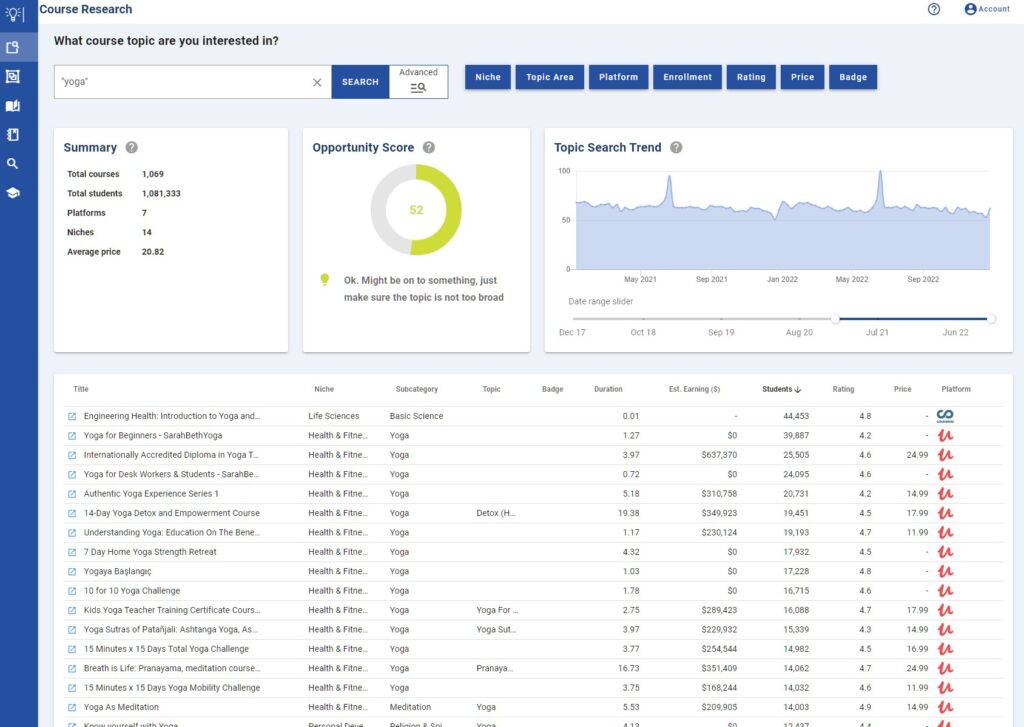
Finding a topic for an online course can be a daunting task. With so many topics to choose from, it can be difficult to narrow down your options and decide on the best one for you to develop and sell.
The best way to find a topic for an online course is to start by looking at your interests, skills, and experience. Identify what you are passionate about as well as what you can bring to the table and create a course based on that. You should also consider researching the topics people are searching for in your industry, as well as any trending topics that may be of interest. Additionally, take a look at the competition and determine how you can put your own spin on their ideas or go even further with it.
You want to make sure that the topic is something you’re passionate about, since you’ll be spending a lot of time developing the course. In addition, it’s important to ensure that there’s a demand for the type of course you want to create.
We get commissions for purchases made through links on this website.
Why develop an online course?
Developing an online course is a great way to share your knowledge and expertise with others, while also generating an additional income stream.
If you want to teach your skills to others, an online course is the perfect way to do this. With an online course, you have the ability to reach a large audience quickly and easily.
Plus, since the courses are digital, you can provide your students with access anywhere they want and on any device they want. This makes learning easy and convenient for everyone involved.
According to Statista, online courses appeal to a wide range of ages, but, as of 2019, skew to the 16-24 year old category.
Building your own brand is another big benefit of creating a course. When people take your course they get to know you, and this can open up bigger opportunities in the future, for example a student becoming a client for one to one coaching.
In addition, creating an online course gives you the opportunity to create content that can be easily updated over time and tailored to your target audience.
With so many people looking for new ways to learn, especially in today’s competitive market, an online course like this can be a great way to learn.
6 steps on how to find the best online course topic
Finding the right topic for an online course can be a daunting task. With so many topics to choose from, it can be difficult to narrow down your options and decide on the best one for you.
One approach is to simply follow your passion—teach what you love! This will usually result in more engaging content and delivery on your part, which in turn should lead to better reviews and student outcomes.
To help make this process easier, here are 10 steps on how to find the best online course topic:
Step 1: Research what’s already out there
To begin your course search, start by using general keywords online. For instance, “Yoga Online Course”.
Keep an eye out for courses that are already available and decide whether there is demand for a similar course or not.
Check out other courses on platforms such as Udemy to see if there is already demand. This can be a time-sucking process. If I’m researching topics I use Eurekaa, a tool that provides you with data from a wide range of platforms; you just enter your search terms to see the results.

If other courses are already available on the same topic, consider how to create a unique approach or attract a different audience. This will help differentiate you in this competitive market.
Step 2: Gauge interest in your topic
Once you have an idea what the course should be about, you should check people are actually interested. If, during the research phase, you didn’t find any courses covering the topic, you may have picked something no one is interested in.
Think about your audience: Start by thinking about who you want to target with your course. Consider what types of people would be interested in the topic and how you can reach them.
Use the 15x10x5 formula for audience research:Schedule 15-minute conversations with 10 people, and ask them 5 questions each (e.g., “Tell me about your experiences with [topic]”, “What’s your biggest challenge with [topic]?”, etc.).
Ask questions that uncover challenges people are willing to pay to have solved: Use questions such as “What blogs do you read frequently? What communities are you a part of online?” or “Tell me about your experiences with [topic].” These will help uncover problems that people are willing to pay for solutions on this topic area.
Make sure to pay attention and pay attention to feedback: Listen carefully to any feedback they offer, and write down any helpful insights!This will help guide the development of your course content later on.
This information is highly valuable and can not only help with course creation, but also ideal customer avatar creation.
For this step I again make use of Eurekaa, checking if the topic I’m interested in has courses with a high number of students. I also pay attention to the opportunity score and feedback the platform gives around the topic being too broad or too narrow.
Step 3: Identify your niche
Picking a topic area, such as yoga, is a good starting point, but it’s too broad a topic for a course. With the topic of expertise chosen you now need to narrow down on a niche within it.
Gather information about the problem your target audience regularly has, as well as any existing courses, eBooks or other information products they can buy on the topic, and whether people are spending money online to get their problems solved.
Once you’re sure that there is demand for what you plan to offer in terms of an online course, rest assured that you can proceed with validating strategies such as checking out how many views/likes/subscribers they have, researching competition (or similar platforms), etc.
Step 5: Choose Your Online Course Topic
Once you have identified a niche within your chosen topic area, it’s time to choose the specific topic for your online course. This should be something that is both interesting and useful to your target audience.
It’s a bonus if you’re passionate about it, but the focus should now be customer first: can you help solve a problem for your customer?
Think about what topics would be most helpful for them, and which ones they would be willing to pay for. In our yoga example, I wouldn’t suggest a general ‘yoga for beginners’ course. Instead, a problem needs to be identified, and a solution found, yoga is the vehicle to get from the start state to the desired state.
Step 6: Create your course (and start making some cash!)
With topic, niche, and problems researched you’re all set to create a killer online course!
Create an outline: Once you have decided on a topic and teaching approach, create an outline for your course that includes all the materials and resources needed for students to complete the course successfully.
Develop slides/videos/other content: Once you have created an outline, start developing slideshows, videos or other content that will help students better understand the information they are given.Students should get some sort of workbook with tasks that they complete in order for them to feel like they’re making progress.
Market & sell your course: Once everything is ready to go (including payment gateways, sales funnels etc), start marketing your course through social media channels like Facebook Ads or Twitter Ads; through online forums like Quora or Reddit; via email campaigns; etc .
There is a little more to developing a course than above, if you want to see a roadmap for success click below.
Final thought
Creating an online course can be a great way to make money and share your knowledge with the world. With the right topic, niche, and content, you can create an engaging and successful course that will help you reach your goals.
By following the steps outlined above, you can find a topic for your online course that is both interesting and useful to your target audience.
Keep in mind that research for online course topic ideas can be as simple as making a list of ideas on a piece of paper. You don’t need to go all high-tech to find the perfect course topic if that’s not how you normally do things.
With some hard work and dedication, you’ll be able to create a profitable online course in no time!
FAQ
What is keyword research?
Keyword research is the process of identifying and researching keywords that people are searching for online.
It involves first identifying the top-level keywords related to your topic, then researching the volume of searches per month for each keyword in order to determine its competitiveness.
Once you have identified relevant keywords, you can use them in your SEO strategy to optimize your content for better visibility in search engine results.
Additionally, keyword research can be used to identify topics that are trending or gaining popularity among users so that you can tailor content around those topics accordingly.
How does keyword research help in choosing the perfect online course topic?
Keyword research helps in choosing the perfect online course topic by providing insights into what people are looking for and how they search for it. It also reveals the potential volume of traffic that can be generated from a given topic.
This helps entrepreneurs decide on a commercially viable topic that is likely to attract customers, as well as give them an idea of how they can reach their target audience once the course is ready. Furthermore, keyword research allows entrepreneurs to identify emerging trends and adjust their strategy accordingly before jumping on board.
How can I use keyword ideas to choose the perfect online course topic?
- Use Google’s own tools, such as the Google Ads Keyword Planner or Google Trends, to get an indication of interest your keywords and understand their competition level.
- Analyze related searches and frequently asked questions associated with your keywords using Google searches to get an even broader understanding of potential topics you could cover in an online course.
- Use the powerful alphabetical auto-completion technique on Google search engines to drill down further into related keywords that may not have come up in previous searches for your primary keyword or related terms you discovered using other methods listed above it (e .g., Related Queries tab).
What are the best sources of inspiration for choosing the perfect online course topic?
The best sources of inspiration for choosing the perfect online course topic are:
- Your formal education and training, courses, workshops, and accreditations: These give you an in-depth look at topics that you might not have known about before.
- Your informal learning such as online courses, books, videos and conferences offer a more general overview of a topic or industry. If it’s something new to you, these can help you gain valuable experience and give you ideas for your own course content.
- Life experiences: Experiences from throughout your life can provide inspiration for an online course topic, from overcoming challenges to successes in various areas of life such as work or relationships.
- Passions , hobbies , interests : What do you love doing? What gets you excited? What topics do you find yourself talking about with friends regularly? These passions can make great topics for an online course if they are relevant enough to attract students who share similar interests with you.
What are the best ways to get feedback from users when choosing a course topic?
- Reach out to your followers through a post, email, or blog and announce that you are thinking of creating a course centered around your topic. Provide details such as the topics covered and ask them if they would be interested in taking the course.
- Ask questions to get insight into your target audience’s needs and challenges. For example, what is the audience demographics that will be serving this course? What challenges do they face in this niche? How are they currently handling these challenges? What books do they read? What blogs do they read? How can you help them with this course? Do they love a solution to their problems in the form of a training course? What format should it take (e.g., video lectures)? And what outcome do they expect out of taking this course (e.g., increased productivity)?
- Use tools like Typeform , Paperform , HotJar , or even free Google Forms for creating surveys to drive targeted traffic to these pages (or use LMS platforms like Thinkific or Kajabi with built-in surveys).
- Analyze results and make changes as needed before launching your course!
What are the best ways to promote my online course?
The best ways to promote your online course are:
- Social media marketing: Leverage the power of social media platforms like Facebook, Twitter, Instagram, and LinkedIn to reach a wider audience and create awareness about your course. Share interesting content related to your topic, post updates about the course launch, and engage with potential customers.
- Paid advertising: Invest in paid advertising campaigns on social media, Google Ads, and other platforms to reach a larger audience.
- Email marketing: Use email marketing campaigns to send out updates about your course launch, discounts, and other offers.
- Content marketing: Create content related to your course topic such as blog posts, videos, podcasts, and infographics that can be shared across various channels to attract more students.
For many of these you’ll need to create a landing page that introduces the topic and offers an overview of what students will learn. This will give potential students an idea of what topics are covered in the course and help them decide if it’s right for them.
How do I determine the right price for my online course?
Calculate the profit potential of your online course: Look at the problem you are solving and determine how much people would be willing to pay for it. Are people already spending money on solutions similar to yours?
Set a price point: Based on your research, set a price point that is fair for both you and your customers. Consider factors such as production costs, how much value your customer will get from the course, and what competitors are charging for similar courses or products/services.
Test the waters with a lower priced “starter” course: Before investing too much time and money into creating an in-depth “flagship” course, test out different pricing points by offering a shorter version of it at a lower cost point first (e..g $100-$200). This way you can gather feedback from potential customers before committing more resources towards creating an advanced version of it (if necessary).
- How to Track and Improve Website Conversion Rates - 14/01/2026
- Best Practices for Call-to-Action Buttons - 09/01/2026
- The Psychology of Colours in Web Design - 04/01/2026


